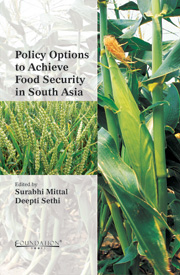Book contents
- Frontmatter
- Contents
- List of Contributors
- Foreword
- Acknowledgements
- List of Abbreviations
- 1 Food Security in South Asia
- 2 Food Security in India: Policies and Options
- 3 Multiple Facets of Food (In) Security in Sri Lanka: An Input to Food Policy
- 4 Food Security in Bangladesh: Achievements, Challenges and Way Forward
- 5 State of Agriculture and Food Security in Pakistan
- 6 Food Security Situation in Nepal: Issues and Suggested Policy Measures
- 7 Food Security in Maldives
- 8 Role of Regional Trade and Rural Development for Food Security in Bhutan
- 9 Food Security in Afghanistan
9 - Food Security in Afghanistan
Published online by Cambridge University Press: 05 June 2012
- Frontmatter
- Contents
- List of Contributors
- Foreword
- Acknowledgements
- List of Abbreviations
- 1 Food Security in South Asia
- 2 Food Security in India: Policies and Options
- 3 Multiple Facets of Food (In) Security in Sri Lanka: An Input to Food Policy
- 4 Food Security in Bangladesh: Achievements, Challenges and Way Forward
- 5 State of Agriculture and Food Security in Pakistan
- 6 Food Security Situation in Nepal: Issues and Suggested Policy Measures
- 7 Food Security in Maldives
- 8 Role of Regional Trade and Rural Development for Food Security in Bhutan
- 9 Food Security in Afghanistan
Summary
Introduction
Afghanistan is a landlocked and mountainous country situated approximately in the South-Central Asia. According to UN estimate of 2009, country is inhabited with around 28 million population. The National Risk and Vulnerability Assessment (NRVA) 2007–2008 states that more than half of the population of Afghanistan lives below the poverty line. Also, around 31 per cent of the total population does not meet its daily food requirements and around 4 million people each year are severely affected by natural disasters.
The overall threat to the food security in the country is due to the ongoing political risks, difficult access to market, poor sanitation, low education level, droughts and floods and environmental degradation. In lieu of these problems, this chapter discusses the policy options available to tackle the issue of food security in Afghanistan. The chapter also throws light on the role of trade and food bank as a way to achieve food security in the country.
Socio-Political Situation and Access to Food
Historically speaking, whenever either food prices soar or a devastating decrease in the production of food occurs, there is an uproar about food security. The price hike of 1970s and mid 1990s, great famine of 1984–85, and decrease in production during the first decade of 2000 are substantive examples in support of the argument. Although food security is a global issue, its incident is unequally distributed across the world and regions.
- Type
- Chapter
- Information
- Policy Options to Achieve Food Security in South Asia , pp. 206 - 223Publisher: Foundation BooksPrint publication year: 2011

